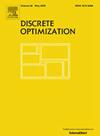Qd的(d−2)泄漏强迫数和GP的(n,1)泄漏强迫数
IF 1.6
4区 数学
Q3 MATHEMATICS, APPLIED
引用次数: 0
摘要
泄漏强迫是最近引入的零强迫的一种变体,已经研究了图族,包括路径,循环,车轮,网格和树。本文推广了先前关于d维超立方体Qd的泄漏强迫数的结果,证明了Qd的(d−2)-泄漏强迫数为2d−1。我们还研究了图G的最小h -泄漏强迫集的大小与最小0强迫集的大小之间的关系。本文章由计算机程序翻译,如有差异,请以英文原文为准。
The (d−2)-leaky forcing number of Qd and ℓ-leaky forcing number of GP(n,1)
Leaky-forcing is a recently introduced variant of zero forcing that has been studied for families of graphs including paths, cycles, wheels, grids, and trees. In this paper, we extend previous results on the leaky forcing number of the -dimensional hypercube, , to show that the -leaky forcing number of is . We also examine a question about the relationship between the size of a minimum -leaky-forcing set and a minimum zero forcing set for a graph .
求助全文
通过发布文献求助,成功后即可免费获取论文全文。
去求助
来源期刊

Discrete Optimization
管理科学-应用数学
CiteScore
2.10
自引率
9.10%
发文量
30
审稿时长
>12 weeks
期刊介绍:
Discrete Optimization publishes research papers on the mathematical, computational and applied aspects of all areas of integer programming and combinatorial optimization. In addition to reports on mathematical results pertinent to discrete optimization, the journal welcomes submissions on algorithmic developments, computational experiments, and novel applications (in particular, large-scale and real-time applications). The journal also publishes clearly labelled surveys, reviews, short notes, and open problems. Manuscripts submitted for possible publication to Discrete Optimization should report on original research, should not have been previously published, and should not be under consideration for publication by any other journal.
 求助内容:
求助内容: 应助结果提醒方式:
应助结果提醒方式:


